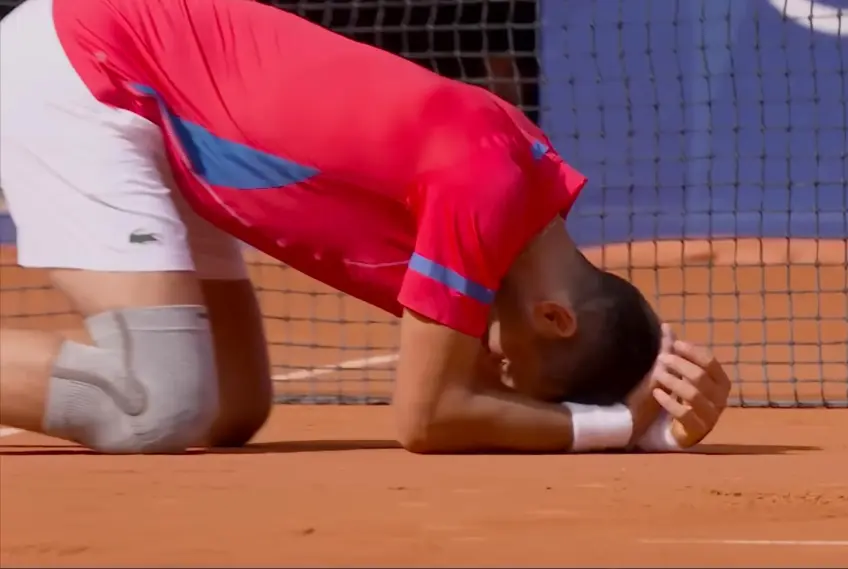
Novak Djokovic’s pursuit of perfection has been a defining characteristic of his illustrious tennis career, and 2024 proved to be a year where that relentless ambition reached its pinnacle. If asked to name the title he most desperately sought this season, there would be no hesitation: an Olympic gold medal. The 24-time Grand Slam champion had conquered every other major challenge in tennis, but an Olympic gold had always eluded him, standing as the lone, glaring gap in an otherwise unparalleled collection of achievements.
The Olympic Games in Paris presented Djokovic with an opportunity to complete his “Golden Career Slam” — a feat only a few in tennis history have achieved. As the tournament approached, speculation swirled about whether the 37-year-old could defy time, injury, and a field brimming with talent to claim the one title missing from his decorated career. Djokovic’s journey to gold would require not only his legendary skill but also the kind of mental fortitude that has become his trademark. The narrative of the Serbian’s quest would become one of perseverance, redemption, and an ultimate triumph that etched another chapter into tennis lore.
Early Rounds: A Statement of Intent
From the outset, Djokovic signaled that he was a man on a mission. In the first round, he faced Matthew Ebden, primarily known for his doubles prowess. Djokovic delivered a masterclass, conceding only one game in a dominant performance. This opening victory not only set the tone for his campaign but also hinted at the form and focus that would carry him through the tournament.
The second-round matchup brought a historic showdown with his long-time rival, Rafael Nadal. Though both players were past their physical peaks, any clash between these titans carries a special weight. On this occasion, Djokovic was imperious. He raced through the first set 6-1 and surged to a 4-0 lead in the second before Nadal mounted a brief comeback. The Spaniard’s resilience forced Djokovic to dig deeper, but he eventually closed out the match 6-1, 6-4. The win marked the end of an era, as Nadal confirmed it would be his final Olympic appearance. For Djokovic, it was another step towards destiny.
Mid-Tournament Challenges and a Test of Resilience
In the third round, Djokovic faced Germany’s Dominik Koepfer, a match he navigated with relative ease to reach the quarterfinals. However, the true test of his determination came against Stefanos Tsitsipas. Djokovic won the first set but encountered a familiar nemesis: his troublesome knee. The injury flared up, threatening to derail his campaign. Despite visible discomfort, Djokovic summoned the strength to prevail in straight sets. It was a performance that encapsulated his career — battling adversity with an iron will and an unyielding desire to win.
In the semifinals, Djokovic faced Lorenzo Musetti, a young Italian with a game as elegant as it is unpredictable. The match proved a psychological hurdle more than a physical one. Djokovic had reached the semifinals in three previous Olympics — Beijing in 2008, London in 2012, and Tokyo in 2021 — and each time, he had faltered. The specter of those past disappointments loomed large. This time, however, Djokovic would not be denied. He delivered a clinical 6-4, 6-4 victory, finally breaking through the Olympic semifinal barrier and earning a shot at gold.
The Final Showdown: Djokovic vs. Alcaraz
The final set the stage for a blockbuster encounter between generations. Djokovic faced Carlos Alcaraz, the 21-year-old prodigy many consider to be his heir apparent. The two had recently clashed in a thrilling Wimbledon final, with Alcaraz emerging victorious. This rematch carried an added weight of history and significance, not just for Djokovic but for the sport itself.
The match was a grueling, two-set battle that stretched nearly three hours, one of the longest two-set matches in Olympic history. Both sets went to tiebreaks, a testament to the razor-thin margin between the two players. Djokovic demonstrated his trademark composure in the decisive moments, saving eight break points in the first set and winning both tiebreaks. Alcaraz, for all his brilliance, could not crack Djokovic’s armor. The Serb’s forehand, precise and devastating, proved the difference-maker.
Statistically, Alcaraz had more winners and more unforced errors, but Djokovic’s ability to generate nearly 50 forced errors from his opponent underscored his strategic mastery. The victory was as much a psychological triumph as a physical one. Djokovic’s roar of victory and the tears that followed were not just expressions of relief but of a career’s worth of dreams culminating in a single, golden moment.
The Aftermath and What’s Next
As Djokovic stood on the podium, the gold medal around his neck, it was clear this was more than just another trophy. It was the fulfillment of a lifelong dream, an achievement that cemented his status as the most complete player in tennis history. “The Olympic Games were the most important tournament of the season,” Djokovic reflected. “Winning gold in Paris, at Roland Garros, was the ultimate goal. It feels like completing the game of tennis.”
Looking ahead to 2025, Djokovic’s focus will return to the Grand Slams. At 38, his pursuit of more major titles will continue. The question remains: Can he defy time once again? If the Paris Olympics taught us anything, it’s that with Djokovic, nothing is impossible. His journey is far from over, and the next chapter promises to be just as compelling as the last.
Leave a Reply